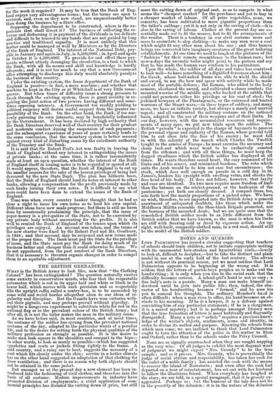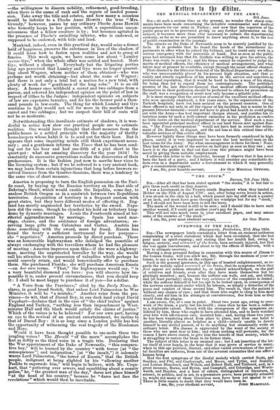NOTES AND QUERIES.
LORD PALMERSTON has issued a circular suggesting that teachers of schools should train children, not to imitate copperplate writing with its ornamental hair-strokes and hyaeinthine curls,—lovely to look at, difficult to decipher,—but to take the distinct and plain model in use at the early half of the last century. The advice is not without its practical reason, yet we must confess that Lord Palmerston appears to be beginning at the wrong end. It is seldom that the letters of parish-boys perplex us to make out the handwriting ; it is only when you rise in the social rank that the difficulty becomes serious. A school-girl's hand is not so easy ; a fine lady's note is a puzzle. Many a man can make himself un- derstood until he gets into public life ; then, indeed, the cha- racter of his handwriting becomes "formed," and he uses his pen to conceal his thoughts. The ordinary Member's haad is often difficult; when a man rises to office, his hand becomes an ob- stacle to his meaning. If he is a lawyer, it is a defence against convicting him of any particular statement; if he is a clergyman, it is a sacred mystery ; but it is perhaps amongst literary men that the true formation of letters is most habitually and flagrantly disregarded. Many a note or "article" requires a previous know- ledge of the writer's objects, sentiments, name and identity, in order to divine its author and purpose. Knowing the schools from which men come, we are inclined to think that Lord Palmerston ought to turn the attention of the police in this matter to Eton and Oxford, rather than to the schools under the Privy Council.
None are so signally overreached when they are caught napping as the very wise. Of all judges to exhibit the most flagrant want of judgment we might expect "Mrs. Grundy" to be the true sample ; and so it proves. Mrs. Grundy, who is proverbially the judge of social station and respectability, has taken her cook for the cadet of a noble family; has assisted the cook with the means to recover the island of Barrataria ; and even after the cook had departed on a tour of reinstatement, has set out with her husband to follow the illustrious friend. When everybody has laughed at the story, we are told, in a special paragraph, that it is grossly ex- aggerated. Perhaps so ; but the humour of the tale does not he in the quantity of the delusion : it is in the nature of the delusion —the willingness to discern nobility, refinement, good-breeding, when there is the name of rank and the repute of landed posses- sion. Take away the title and estates, and how many a countess would be inferior to a Phcebe Anne Hewitt: the true "Mrs. Grundy," however, passes by any ordinary Phcebe Anne Hewitt who honestly keeps to her position, with a supercilious uncon- sciousness that a fellow creature is by ; but becomes agitated in the presence of Phoebe's swindling inferior, who is endowed, or supposed to be endowed, with title and land.
Mankind, indeed, even in this practical day, would seize a firmer hold of happiness, preserve the substance in lieu of the shadow, if it could learn how to fasten upon realities and not to grasp at fancies. This week again, we have some law about "Lumley versus Gye," when the whole affair was settled and buried. More Gye, without a change ! Everybody but the litigating parties long ago perceived that Lumley and Gye were no longer quarrel- ling about Wagner, whom neither of them obtained—who was perhaps not worth obtaining—but about the name of Wagner; and there is not only a trial but a motion for a new trial, with plenty of work for "gentlemen of the long robe." It is an old story. A farmer once withheld a carrot and two cabbages from a parson, and referred his independent opinion on the point of law in respect of tithes to the Judges : independent opinions on subjects of law are expensive luxuries, and for his the farmer paid a thou- sand pounds in law-costs. The thing for which Lumley and Gye continue to fight would not sell for more in the market than a carrot and two cabbages; but we suspect their bill of costs will not be so moderate.
Notwithstanding this inordinate estimate of shadows, it is won- derful to notice how slow our practical people are to estimate realities. One would have thought that short measure from the public-house is a settled principle with the majority of thrifty housekeepers whose habit it is to send out for their beer. But it appears that some inquiring minds still think experiment neces- sary; and a gentleman informs the Times that he has been send- ing out for his beer and had one-fifth of a pint short in the quart-pot : what an amazing discovery for the year 1854! So constantly do successive generations realize the discoveries of their predecessors. It is the fashion just now to ascribe beer vices to the licensing system ; but if we be referred to a very ancient book, we may learn from certain injunctions that long before brewers re- ceived licences from the Quarter-Sessions, there was_a tendency to the same vice of short measure.
America is proposing to turn the English possession on the Paci- fic coast, by buying up the Russian territory on the East side of Behring's Strait, which would enable the Republic, some day, to enclose British Oregon as in a sandwich between two Republican territories. Acquisition of territory is a frequent custom with great states, but they have different modes of effecting it. Eng- land has mostly augmented her territories by the sword. Napo- leon did the same, though he clenched his hold on tributary king- doms by dynastic marriages. Louis the Fourteenth aimed at ter- ritorial aggrandizement by marriage. Spain has used mar- riage, chance, and the assistance of foreign adventurers; re- Delving large gifts from Columbus and Cortez. Austria has done something with the sword, more by fraud. Russia has found the treaty a sufficient instrument for her purpose— she "negotiates." America proceeds by direct purchase. There was an honourable highwayman who indulged the punctilio of always exchanging with the travellers whom he had the pleasure of meeting : America improves upon this—if she were a highway- man, meeting the unprotected traveller by the way, she would call his attention to the possession of valuables which perhaps he could scarcely retain, and would benevolently offer to purchase them. She purchased Florida; she will purchase American Russia —on her own terms. "That," the highwayman would say, "is a very beautiful diamond you have : you will observe how im- possible it is, under present circumstances, that you should keep
: I shall be most happy to purchase it of you—for a dollar.
"A Voice from the Provinces," cited by the Daily News, de- clares, in good broad Scotch, that unless Lord Palmerston be War Minister, it will be "a mistake." Another voice from the pro- vinces—to wit, that of Daoud Bey, in our dark land yclept David Urquhart—declares that in the case of" the chief traitor" against England and Turkey, "nothing less than impeachment in West- minster Hall and the block would satisfy the claims of justice." Which of the voices is to be believed? For our own part, having an eye to the revival of an ancient entertainment, we incline to that of Daoud Bey : it is so long since a London public has had the opportunity of witnessing the real tragedy of the Headsman and Hero.
Would it have been thought possible to rec3ncile these two jangling voices? The Herald "of the morn" accomplishes the feat as deftly as the third voice in a tragic trio. Declaring that the War appointment of the Duke of Newcastle, "this compara- tive boy," will be learned by the country "with terror [at "the eonsequences "] and indignation," [at "the insult,"] it solemnly warns Lord Palmerston, "the terror of Russia," that the British people, indignant at being slighted by his "allowing another Eeelite to supersede him," will begin to believe, with Mr. Urqu- hart, that "pottering over sewers, and squabbling about a county police," he, "the greatest man of the day," dares not place himself "at the head of his country," because he "dares not face the revelations" which would then be inevitable.



























 Previous page
Previous page